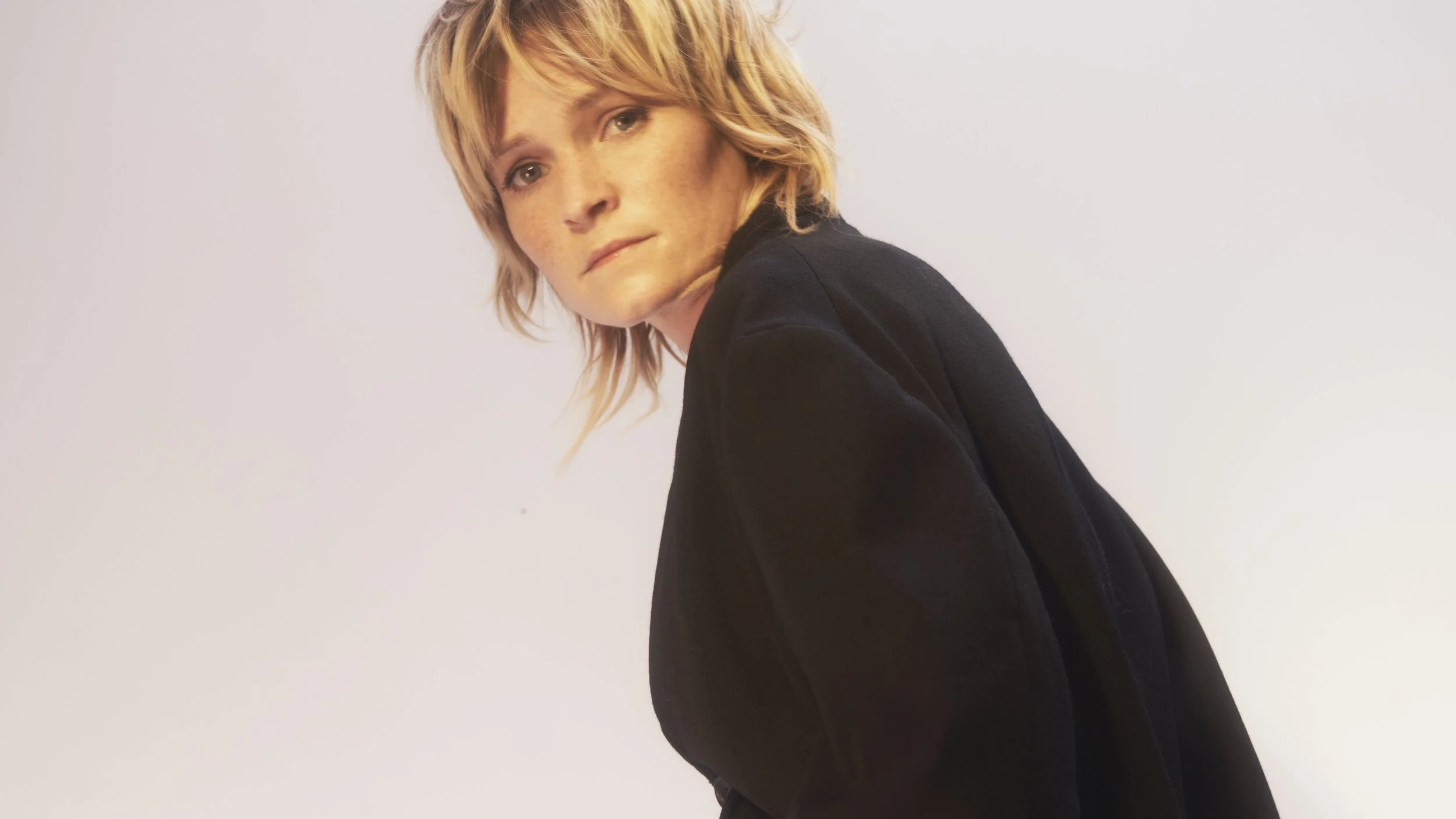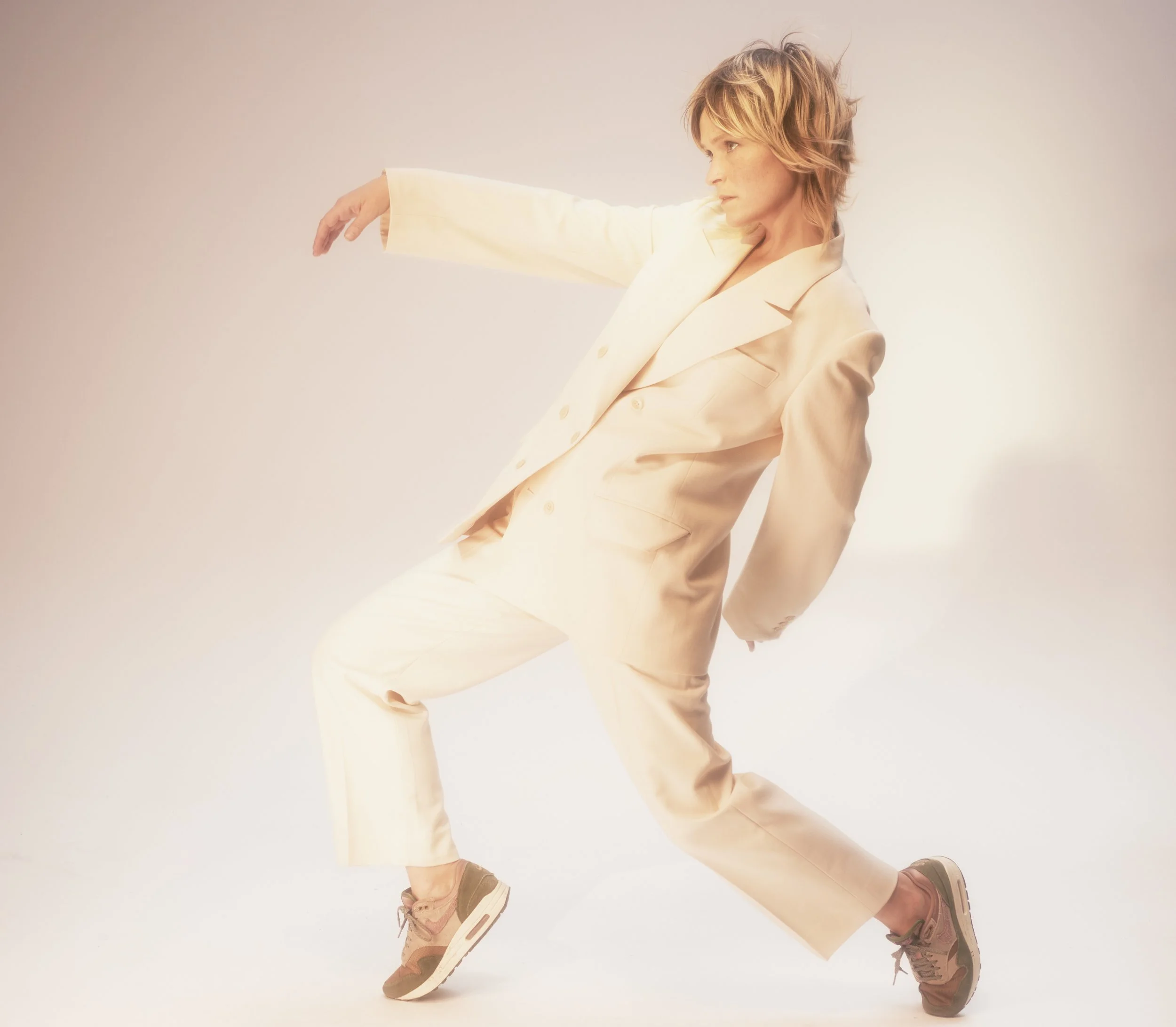The Debrief: Billy Nomates
Credit: Eddie Whelan
“It's been a strange time for all of us, hasn't it?” opens Tor Maries, AKA Billy Nomates, on the topic of the music industry’s emergence from the coronavirus pandemic. Strange indeed, stranger for Maries even, as the Bristol-based musician keenly admits after we begin our early morning chat over Zoom. As the world wound down during the dizzy heights of the 2020 lockdown and workers retreated to their homes to the tune of faux applause for doctors and nurses, a beacon of brutal truth and hope essential to sonic lockdown dwellers divaricated across the country. Packaged cleaner than a Beer52 subscription, it came in the form of Nomates’ self-titled solo debut record.
When her first studio full-length arrived to widespread acclaim from peers and fans alike, one person who seemingly wasn’t basking in the glory was Maries herself. “It stuck with me because it was a really weird time to have success. I will always feel a degree of guilt about that,” she says. “I can't help it. It was such an odd time to enjoy the success that there's a bit of disconnect there. I do often have this thought of, was that the start of it? Is this a regular thing that's gonna happen in our lifetime?”
As Maries’ guitar peaks out of the corner of the screen, her kitchen serves as the backdrop to our chat, which is a seemingly perfect conversational segue into my next question. After all, it was in the kitchen that she first served up her acerbic brand of witty lyricism that was to form the building blocks of albums one and two. Whilst album one was devised entirely in Maries’ current rented home, ‘CACTI’ split her time between kitchen and studio, decamping to Invada Studios to work more closely with collaborator and friend Geoff Barrow. Despite affording Maries much more technical sway, it was of high importance that she nor her producer polished the sharp edges that garnered the snowballing reputation she’s more than living up to. “I'm not sure that I've got the balance quite right with it. I mean, I've never worked at a professional studio in my life before. I've gone from my sister's kitchen to my kitchen now… a rented one,” she laughs. “To go to a professional studio to make a record was like ‘what the hell… that's crazy’. So there was a real conscious effort to make it a bit shoddy. I truly don't ever want to make songs where the edge is always me. You know, there is a little bit of overlap, there are things that don't quite fit because that's integral to a Billy Nomates record. I was conscious to not over-egg it; that's harder than you think when you're in a nice place because the temptation is to do that.”
Credit: Eddie Whelan
Longing to find the right balance between those haggard edges and a polished finish creeps into Maries’ writing too. When she spoke of the words being penned for her first album “total honesty” was the end goal. On ‘CACTI’ it’s no different; Maries is once again in scintillating form. Taking on myriad themes as far and wide as self-destruction, depression and economic struggles, she eloquently wrestles with uncomfortable truths and faces past traumas head-on. “I think for me, there's no hiding and music is just all gonna come out. And whatever is true at the time, or however I'm feeling about a certain situation, it will transpire musically,” she explains. “There's that honest streak in the songs, but I suppose it's just what you're being honest about… what you're facing in that subject will always change, but my reaction to it will always be excruciatingly honest, you know?”
Excruciating honesty could well be Maries’ mantra; defiant in adversity and avoiding conformity at all costs, she often explores the darkest corners of her mind lyrically, to make sense of what she calls the sometimes “strange” parts of life. Tackling topics that many a songwriter would fear approaching, Maries invites her listener to lean into her acidulated delivery with the hope of honing the same evacuant feeling she did when she wrote songs like ‘saboteur forcefield’; the pep-talk-like cut that reconnoitres her experience of self-destruction. “It’s really cathartic just to have a way of acknowledging and addressing things or to put some words down to a certain feeling. It allows you to make sense of it,” she says. “Tracks like that [‘saboteur forcefield’]... we all know what that is. It's such a human thing to self-destruct, it's intrinsic, we are the builders and the destroyers and the two go hand in hand. It's really complicated. I was trying to just stab at that feeling, but it's like, how on earth do you undress it?”
“I’ve made a living from music, and I’ve not made a living from music; I can categorically say that it comes from the same place”
With those past experiences in the not-so-distant rearview mirror, Maries has been afforded some breathing space owing to her continued success as a now full-time recording and touring artist; something she has strived and starved for since her early 20s. While she acknowledges she’s not too far from the days of living hand-to-mouth on mates sofas, the mere fact that Maries survived the emotional and economic issues that come hand-in-hand with any creative struggle only further authenticates the resonating messages she stirringly reveals to listeners. “I understand that people don't have disposable income for nice things at the minute. I get it, I've been in that position. I'm not too far from that position at any given time myself,” she honestly admits. “So I am optimistic, but hopefully, I'm just in tune with how things are because I'm just a human being like everyone else, paying my rent and bills. So I just want to be able to put this record out and for people to enjoy it. If they can pay for it, brilliant. If they can't, it's all right. I also just want them to hear it. I've made a living from music, and I've not made a living from music; I can categorically say that it comes from the same place.”
It’s Maries’ lived experiences that make her songs so candid in content and arguably more vital than ever. With the country gripping with several crises, from the decade-long undervaluing and underpayment of public sector workers to the financial strains currently facing the NHS and the wider population, everyone’s feeling a pinch in their pockets. Clinically aware of this fact and almost obsessive over its deliverance, Maries acts in ways she’s able to; by lyrically dismantling the wrongs of the establishment and encouraging working-class solidarity in a music industry increasingly polluted by nepo babies and double-barreled surnames. “We grew up with three kids on one wage, with no money in a market town where nothing is happening, it shapes you, because you are just aware of what it's like to not have a privileged life,” she explains purposefully. “Music and the arts were these fun things to do, but you were almost told you'll never make a living doing that, not if you’re from round here. That's what it always felt like and I suppose you can't help but notice how a lot of the music industry... there's a lot of privileged people here. The opportunities are less for working-class people in the arts; the privilege you then have as an artist is to recognise that and to get artists on a support slot or try to bring them in.”
Credit: Eddie Whelan
But just how is that to be achieved when the current Westminister cabal…or cabinet depending on your political leanings, seems hell-bent on destroying arts, culture and music in the UK? The arts are, after all, where the majority of the government’s most famous critics sit, and now Maries can count herself part of the same club as her renegade contemporaries, past and present. The likes of John Lydon, Vivienne Westwood, Terry Hall and Patti Smith come to mind when you’re forced to draw zeitgeist-affirming comparisons with Billy Nomates as a creative force; their attitudes, observations, and artistic flair were all born out of the same moral and economic oppressions as those faced by Maries herself. “The Tories have made no secret about the fact that they just don't value the arts, from having no safety net in the pandemic; creative arts, any freelancers, it was like being just left to rot and die because you weren't valued,” she states assuredly. “Cutting all the arts funding in education, this whole maths thing... I think back to when they came out with the ballet dancer advert where it was like, ‘she doesn't know it yet, but her next job is in cyber’. That's one of the most brazen things that the Tories have done in a long time. I often think of it because what they did there was tell us they aren't hiding this. If you take that road, they will make it fucking hard for you... and they do. It feels like my government want me dead.”
Like many adolescents who grow up more acutely aware of real-life pressures than some of their peers, Maries is completely self-assured about her “working-class upbringing” in a single-parent household, which thanks to her music teacher dad, was a space with allowance and encouragement to be creative, simultaneously soundtracked by Maries’ father’s love of what she calls “acerbic punk meets Americana.” Like many teenagers, the school music office was a place of refuge for Maries, it was a sanctuary in which she didn’t butt heads with teachers, instead choosing to fuel her youthful angst into writing, playing the guitar, forming bands with her friends, and bonding with her father over a shared passion for their eclectic tastes. “Americana growing up, it was just a sound that wasn't from here… as a kid, anything that's different is really exciting,” she explains passionately. “You know, it's the Great American Songbook for a reason; they're great songs and they stay with you. On the other hand, my dad had this sort of lovers route for real hard punk and old Stranglers tracks. It all filters in; you think that you've made your mind up as an adult and you've just come up with this sound but I look back on my stuff, all the components and all the parts of it. They've got slight punk influences, slight emoticon influences, you know, it's all in there, so I'm just not half as original as I'd like to think.”
“Being inspired doesn’t work that way; inspiration will sit you down one day, and normally when you should be fucking doing something else”
Self-deprecating, almost to a fault, Maries’ reflective tendencies coupled with a drive for perfection have been enablers of sorts for the originality she’s become synonymous with. She’s made references in years gone by to owning her material, avoiding, at all costs, the tempting allure of falling into a pool of lyrical esotericism. “If I don't have anything to say, I don't say it. If I don't think or feel something quite intensely, I don't bother. Maybe that's laziness,” she takes a contemplative pause. “Maybe that's not the makings of a good writer, but at the same time, sitting down and being inspired doesn't work that way; inspiration will sit you down one day, and normally when you should be fucking doing something else.”
Maries’ success to date hasn’t come without its fair share of emotional baggage; whether it be the struggles she faced finding her musical identity, surfing sofas, getting fired from jobs she hated, and being rejected to study music at BIMM alongside her former bandmates, barriers have been thrust in her path, almost enticing her to quit altogether. However, it’s these perceived failures that led to the birth of Billy Nomates; without them she wouldn’t be here today. Something Maries was overtly keen to highlight. “Everything that didn't work was positive, it meant that this worked,” she states resolutely. “So you look back and you go, I was heartbroken when that band fell apart. I was heartbroken when that job and relationship fell apart, but it all meant that I could do something new. Every time I started something new, I was a little bit less fearless, and a little bit more willing to just go… what do you think and feel? And how do you want to conduct this? Because it's this or nothing. As long as I can always feel that way about it, then I don't regret any of the failures.”
Credit: Eddie Whelan
With the world at her feet, failures firmly a thing of the past, and a resistantly upward trajectory ahead, Maries is feeling efficacious about her future and ‘CACTI’ is yet another piece of silverware to add to the expanding Billy Nomates trophy cabinet. What’s next though for the artist who just longed to be recognised for her talents? Surely she has already exceeded her wildest dreams of record deals, sold-out tours and collaborations with music royalty? “I hope that after ‘CACTI’, I can have a minute to recalibrate and rethink again,” she says matter-of-factly. “If you just keep talking, what are you really saying?”




